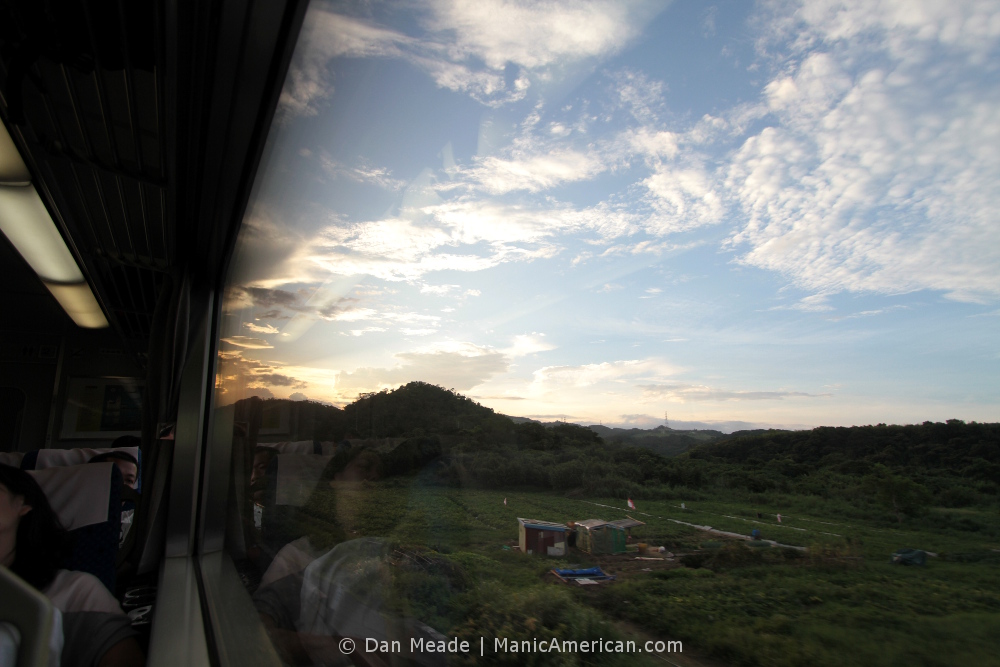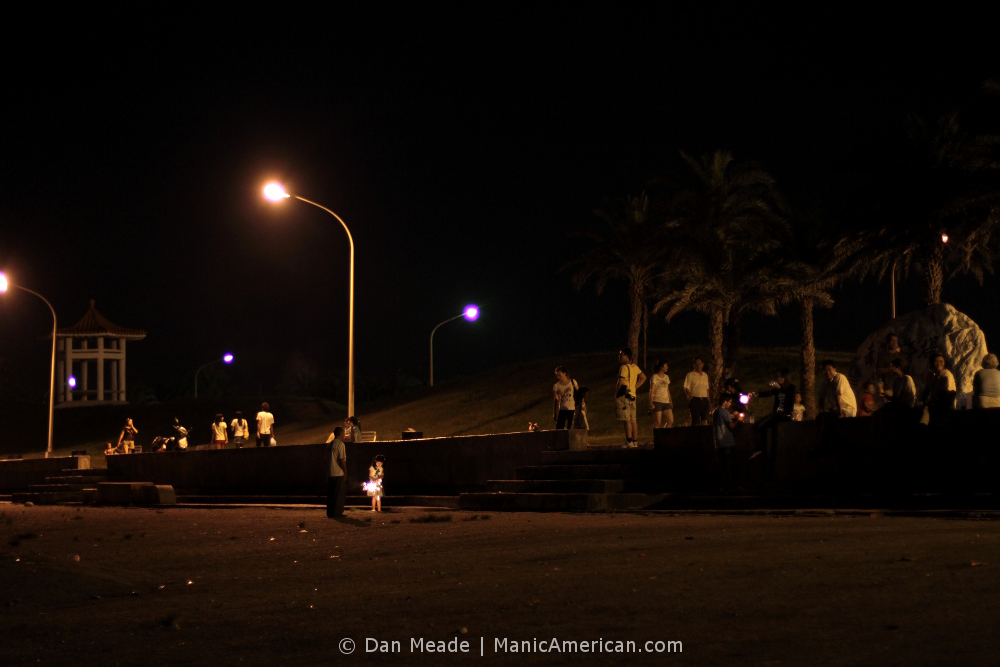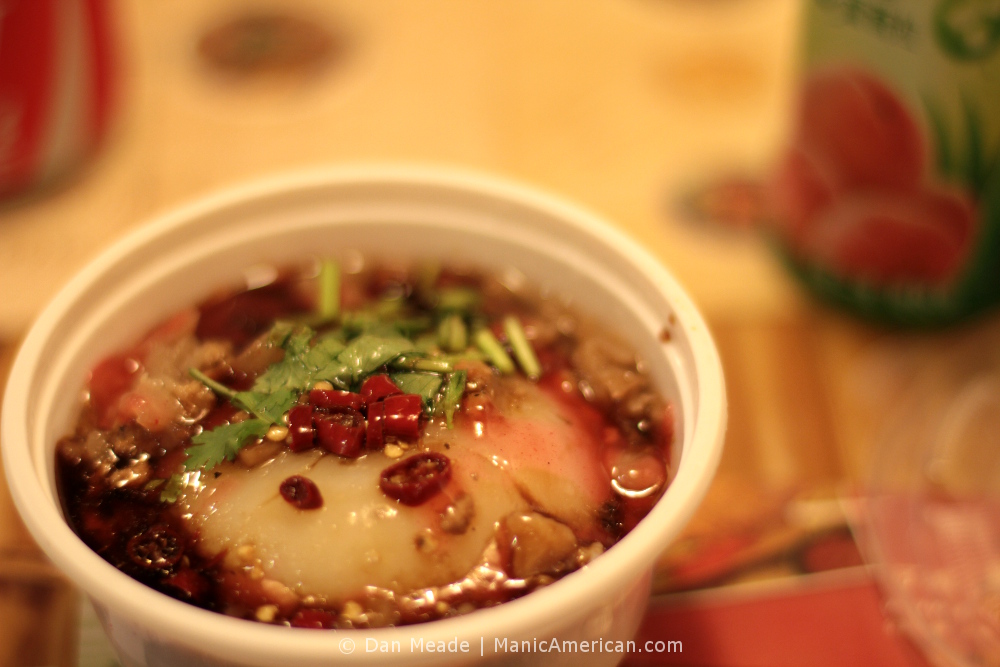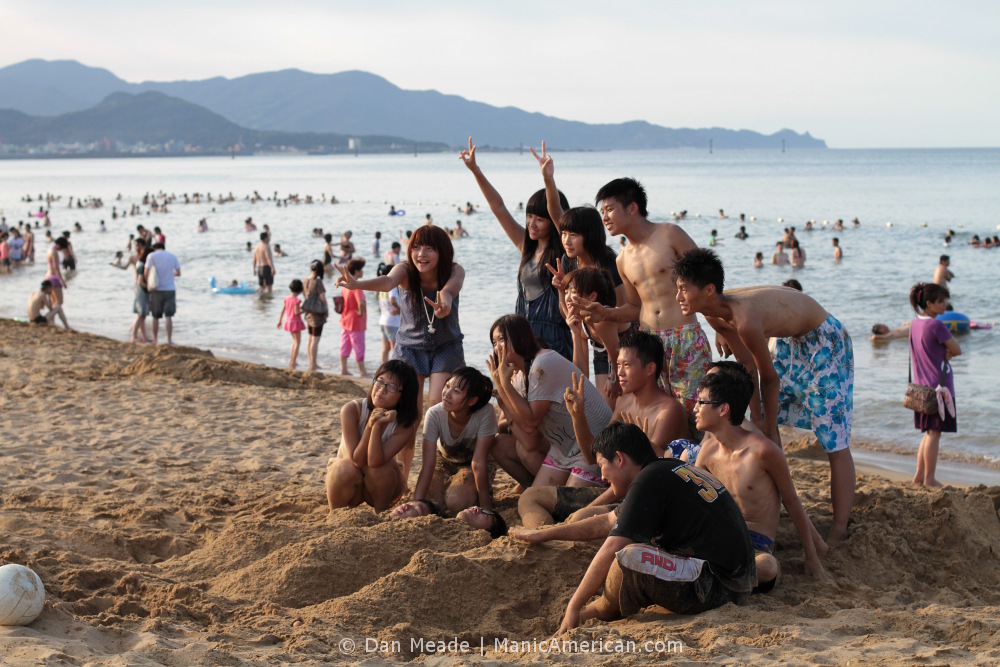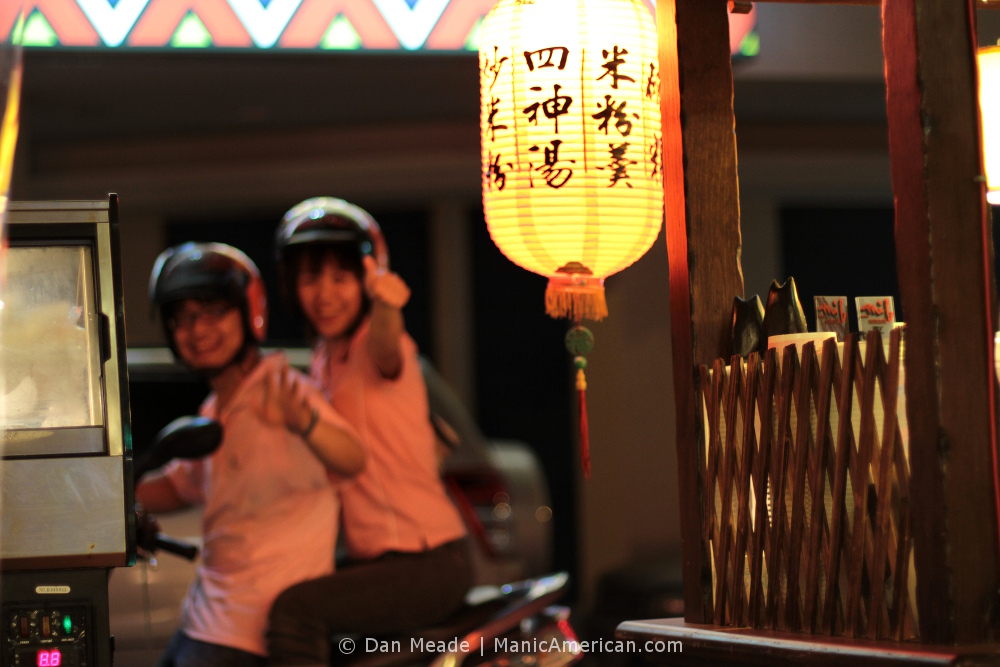The Taiwanese people we met were so friendly that it was almost off-putting. After traveling through Japan and Korea, we had gotten used to people welcoming us into their store or restaurant, or trying to help us if we asked for directions. In Taiwan though, people would help us without needing to be asked, going out of their way to see that we did not have any trouble. We were regularly blown away by their kindness, which was all the more shocking due to the precarious situation of their quasi-nation.
In 1949, unable to re-take Beijing in the wake of Mao’s Communist Revolution, the democratic government of China under Chiang Kai-shek fled to the island refuge of Taiwan along with its army and supporters. In the years since, a tense peace has settled over the Taiwan Strait as Beijing and Taipei have come to accept this split-nation “status quo.” At present, Mainland (Communist) China could invade at the slightest provocation, and certainly would if Taiwan were to declare itself an independent nation. Yet, despite this cloud of political uncertainty hanging over them, Taiwanese people on the whole will go out of their way to help a stranger in need.
An Invitation at Taipei Station
Our guidebooks had mentioned this phenomenon, but we didn’t put much stock into what they said and certainly didn’t expect to experience any outsized kindness. That expectation was shattered almost as soon as we stepped into Taipei Station, the main train station in Taipei. The three of us walked in and worked our way to the ticketing area at the center of the station. Standing just beyond the lines of commuters buying tickets, we stopped to check the schedules to see which train would take us to Hualien that night.
Almost as if on cue, a Taiwanese woman of about college age came up to us and, in very good English, asked us if we needed any help. We told her which train we were looking for, and not satisfied with sending us on our way, she continued to ask us about the rest of our trip and our plans. She went on to invite us to visit the National Palace Museum where she interned. What she said truly carried the weight of an invitation — she wanted us to join her in experiencing the Palace. She told us that she invited everyone to go, and we believed her. It was a nakedly honest wish for us to see something that she thoroughly enjoyed and took pride in.
We went our separate ways and the three of us chalked the encounter up to a round of “wow, she was adorably nice” remarks, not realizing that her level of helpfulness would become the norm, and not the exception, during our stay in Taiwan. Later, riding the train south, we passed through towns made of dilapidated buildings. In between these would be hints of the lush forests and the rolling mountains that make up the interior of Taiwan. Then came the beaches — strips of clean sand, lapping waves and clear water.
Was it the physical geography of the island that made the people who live on it so open-hearted? Could the scenery have been so calming and relaxing that it brought out the kindness and friendless of the Taiwanese?
Changing Habits at Hualien’s Night Markets
That night in Hualien, we ended up at the Nan Bin Night Market, which is not one of the two night markets that tourists are directed towards, but a smaller one, where we were the only outsiders. Located just off a small beach on the outskirts of town, the market wasn’t big, but the aura it gave off was one of peaceful enjoyment. We didn’t stay long as the only food available was of the skewered squid and candied tomato variety, but watching the families relax under the moonlight as a handful of children played with sparklers was like a soothing balm to our senses after the morning’s delayed flight from Seoul and the three hour train ride that had taken us to Hualien.
We hailed a cab and used our map to show the driver that we wanted to go towards one of the more central night market areas, where the map said there was a “traditional food area.”
He began driving us there, but as we got closer, he began trying to tell us something. All we could make out was “sleepy chow, sleepy chow!” Trying to get his point across, he then put his head on his hands, mimicking a sleeping child. We only realized what he was trying to tell us when, after he had dropped us of, we found nearly all the food stalls closed. It may have been because we didn’t quite understand his warning, but whatever the reason, the cabbie rounded down our fare.
There was one small shack still open, wedged between a series of other stalls, but it appeared to only sell soup. As we walked past, the woman cleaning the next stall saw Rob’s swirl of hair and pantomimed an afro to her co-worker. When Rob spotted her, she smiled and exclaimed “HAIR SOOOOOO CUTE!!” Rob smiled back and the woman asked if his hair was “nature?” He told he that it was and we kept searching to see what else was open.
Nothing else was. We went back to the small soup shack, whose signage was in Mandarin and whose cook didn’t speak any English. The Hair So Cute woman overheard our muddled attempt to figure out the menu and came over to translate for us. The conversation kept revolving around her warning us that something was “hot” and us trying to convince her that spicy food was what we liked. We all enjoyed the ordering process and Rob and I ordered a pair of Sichuanese dishes, his based on ground pork and some type of glutinous rice while mine looked more broth-based and consisted of noodles and spices. Both were excellent. As we sat in the back of the shack eating, the Hair So Cute woman and her co-worker drove off on their scooter, shouting goodbye and giving us a thumbs-up as they left, smiling the entire time.
As the shack closed up for the night, we walked back out to the street needing to get to our hotel. We walked for a couple of blocks without seeing any cabs. Stopped on a street corner in a small town halfway around the world, we must have appeared to be lost as a series of scooters drove past. Two of the scooters stopped, circled back around, and the rider of one got off. She took off her helmet and asked us, once again in very good English, if we needed any help. We told her that we needed a cab and she sent her boyfriend off to get one as she called up a cab company, the combined action ensuring that we would get back to out hotel that night. As we waited for a cab to come, she gave us her card and told us that if we were ever back in Hualien that she would give us a personal tour of her hometown.
We had never run into such a series of nice people, much less met so many on the same day. There was no hint that their friendliness was because of America’s role in keeping relations peaceful between Taiwan and (Mainland) China. We weren’t marks to be robbed nor so desperate-looking that their kindness was just masked pity. Every indication was that they had all been nice to us because we were visitors to their land, and they wanted to help us on our way.
As a result of all this kindness, as a group, we began to let go of all the warnings we had been given about people and traveling while growing up. As the Taiwanese people opened their hearts to us, we likewise opened ours. Spending time in Japan can make one more courteous, but spending time in Taiwan can make you more kind. We found ourselves trying to help others who seemed to be in need, ready to give our seats up to those who needed them on trains, offering to take photos of Taiwanese tourists visiting their country’s attractions, doing little things for strangers just because they were the right things to do. This continued as we traveled from Hualien to Tainan and back to Taipei.
The Best Lunchbox in Fulong
We spent our final day in Taiwan at the beaches outside of Taipei, and they were as pristine and relaxing as those we had seen from the train windows days earlier. Getting off our train at Fulong, we took a cab from the main beach to nearby Yanliao Beach Park that had been recommended by our guidebooks. Yanliao’s beach was very nice, but it was also nearly empty, probably due to the multiple “no swimming” signs and the nearby desalination plant.
When it was time to go back to Fulong, we tried to ask the man at the park’s gate to call us a cab using the business card given to us by the cabbie who had dropped us off. Our efforts were… unsuccessful, to say the least. Just as things began to look worrisome, someone approached us asking if we needed help. We readily said yes and the stranger began talking to the gatekeeper in Mandarin. The gatekeeper showed the stranger a list of phone numbers that he could call, but as the stranger started dialing his iPhone and walking away, he forgot the number.
The stranger asked us again where we were going. We told him Fulong, right by the train station, and he seemed to think for a moment. Then he put his iPhone back in his pocket and told us that he would just drive us there himself. Not at all expecting this, we asked if he was sure, and he said yes and began walking toward the parking lot.
Once at his car, the stranger poked his head in, began talking to his wife, who was with infant son, and she shuffled some things around inside the car. The stranger helped us put our things in his trunk, and then the three of us got into the back seat of his car. On the drive to Fulong, his wife apologized (via her husband) for not speaking English and we learned that the stranger had gone to graduate school in Syracuse. The conversation moved on to food, and the stranger said that he would show us the best of the lunchbox places in Fulong.
Once we found a parking spot, the six of us left the car and walked to the lunchbox restaurant. Inside, he ordered for us and made sure that the cooks gave us the freshest pork in the four lunchboxes, three for us, one for himself. Rob offered to pay for all, and the stranger waved him off. Lauren then offered to pay for all and the stranger waved her off even more pointedly — he would hear nothing of the sort. Having seen this, I didn’t want to offend him by also offering to pay for lunch. The meals purchased, the stranger took his, wished us well and left, rejoining his family outside.
We never learned his name, but perhaps that was part of his generosity of spirit, that he would transport and feed strangers in need just to help them. We couldn’t return the favor to him, but we did take his kindness to heart.
Growing up in New York teaches you to close yourself off to strangers, to be wary of others, especially when in a strange place. Having an entire quasi-nation open itself up to you, to help you on your way, you learn to break down the barriers you’ve built up around yourself, to be more open to others. To keep that openness, and bring it back with you, is better than any snow globe or keychain or any other kind of souvenir.
Click here to see more “Hualien at Night” photos on Flickr.
Essay and Photos by Dan Meade
Published: 9/09/2010
Dates of visit: 7/29 – 8/01/2010
